News and Events
International Youth Day with TUDLab
12 August 2022
TUDLab's Lisa Law hosted regional Queensland high school students to consider the role of science and urban planning in building a city resilient to hazards. We focused on building a medium-density neighbourhood on a 10-ha site just north of the James Cook University Cairns Campus. We heard from experts on mapping the site with drones (Karen Joyce), acid sulfate soils (Paul Nelson), urban hydrology (HanS Lim), and ecology (Brandon Espe and Myles Menz). Cairns has a housing and land shortage and we must build differently to sustain our unique tropical lifestyle. Collaboration across silos is the key to building a resilient Cairns!
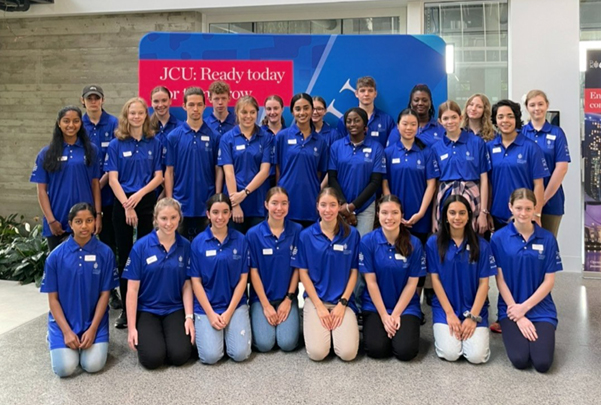
New Paper: The Influence of Trail Design on the Impacts of Walkers, Mountain Bikers and Multi-use Trail Users
9 August 2022
Design also happens in the rural tropics!! A team led by Leah Stevenson explores how the design of mountain bike trails influences their environmental impact. The research was part of a larger study exploring the environmental, social and economic sustainability of mountain bike trails on the Atherton Tableland. Mountain biking is a growing and important part of the FNQ economy, and the research provides important insights to how to how this can be measured.
The abstract: “Trail design and building guidelines are essential tools for influencing the behaviour—and therefore the environmental impact—of users of walking, mountain biking and multi-use recreation trails. Yet, these tools are often not explicitly considered in research that monitors their environmental impact. This is the first study to investigate the role of trail design in shaping how walkers and mountain bikers utilise mountain biking, walking and multi-use trails. The research differentiates trail feature types to examine how they shape user behaviour and, therefore, environmental impact. This observational study uses time-series photographic imagery to examine behaviour and impacts over 12 months. Impacts at each site were examined using current trail building design guidelines. The findings show that shortcuts were commonly employed to avoid long sections on walker-only trails, and to cut across meandering tracks on the multi-use trails in the mountain bike park. Trail spread occurs when walkers use the edges of the trail to avoid rough or uneven surfaces such as stairs and tree roots. Depressions in the trail before technical mountain biking features such as berms and drops were also apparent. Further observations include toilet paper and litter on the walking trails. The research furthermore indicates the unintended environmental impacts when trail users did not adhere to specific trail features or did not use the trails as intended. Unique trail design principles are required where walkers and mountain bikers use the same trails, and this paper provides recommendations for improving trail design.”
View the paper in the Journal of Responsible Tourism Management.
TUDLab at JCU Inspiration on Tap
18 July 2022
TUDLab's Lisa Law spoke at the JCU Inspiration on Tap at the Salt House, talking about everything from how the LA River was represented in Terminator 2, all the way to pulling weeds from the drains of Smithfield Village.
Lisa unpacked: “Concrete may have taken over our urban waterways and stormwater systems as an efficient way to direct drainage, but it comes at the cost of our natural environment. What if there was a better way to design them and at the same time protect the Great Barrier Reef and improve liveability?"
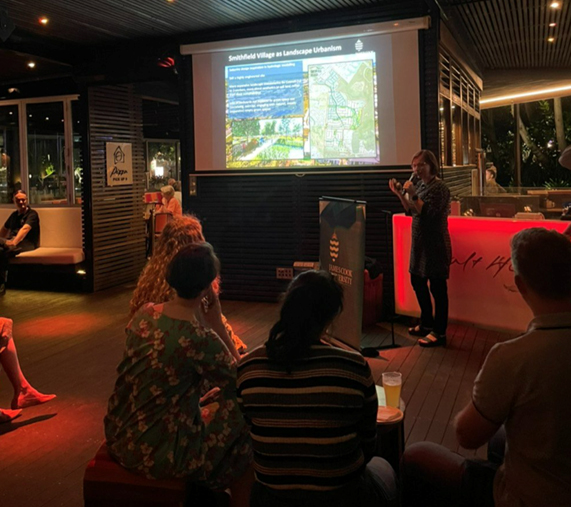
TUDLab at 2022 IAG Conference
TUDLab's Rana Dadpour and Rachael Walshe spent 2022 NAIDOC week on Anawain lands presenting their work on migration to regional cities and innovative methods for research with busy people at the Institute of Australian Geographers conference in Armidale.
Congrats to both for receiving scholarships to get out there and share their ideas.
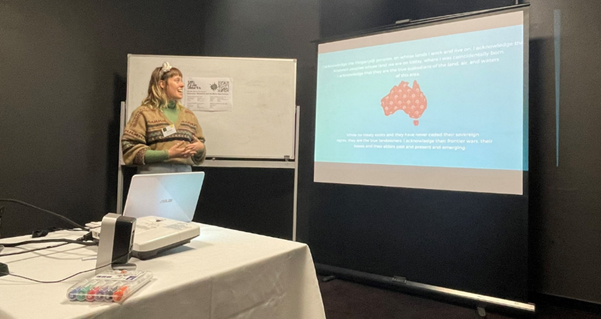
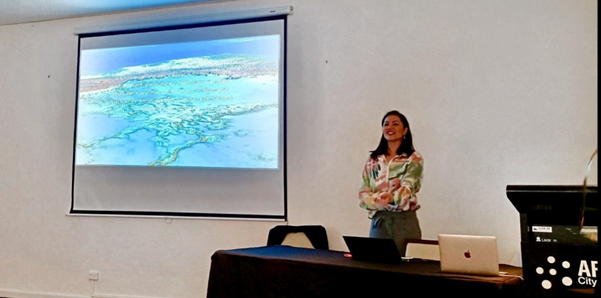
New Paper: Renovating Munro Martin Park in the Arts and Cultural Capital of the North
30 June 2022
Ready for some critical perspectives on the creative city of Cairns? TUDLab's Tony Castles and Lisa Law explore the contradictions of renovating the city for arts and culture uses, contemplating just who this new city is for.
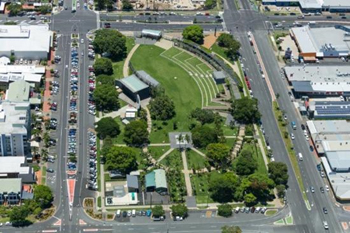
From the article: “Although the redevelopment of Munro Martin Park is part of a vision for Cairns as a hub for arts and culture activities, it is important to ask at what cost. The controlled and surveilled nature of the park no longer permits the use of the space for rough sleeping or informal community events, although its redevelopment has increased visitation and created a safe and inclusive public space for middle class residents to enjoy the arts and contemplate the city’s history. With Marcuse and Mitchell we think it is important to ask larger questions about whose right to the city, and to see the remaking of urban sites as ongoing struggles over public space. In a city with one of the highest rates of homelessness per capita in Queensland, the renovation of this site of refuge reflects neoliberal tendencies in the creative economy to remake the city without due attention to the exclusion of undesirables and growing spatial inequality.”
New Paper: Building community (gardens) on university campuses
29 June 2022
TUDLab's latest article out in Landscape Research is out! Rachael Walshe and Lisa Law explore the role of community gardens and campus master plans in creating community and civic engagement for the post COVID19 university JCU: James Cook University, Australia.
Abstract: “Urban community gardens are well known as safe and friendly spaces that help shape a sense of community. Their capacity to reflect these ideals in the higher education policy sector has been less examined, even though students are particularly well-disposed to reaping the healing benefits of gardens. COVID-19 displaced students and shut down campuses globally. With Australian universities reopening, fostering a sense of community and re-establishing campus culture is among top priorities. This paper uses a multiple case-study methodology to explore how a unique policy instrument—the university ‘master plan’ - expresses the benefits of campus community gardens, as green community spaces, and how they might better aid universities in achieving strategic missions. The research compares dominant themes in the community garden literature with the visions of campus master plans to understand how community gardens might be better positioned as tools for place and community building. The results provide a finer-grained understanding of green infrastructure in campus master planning for a post-COVID-19 moment.”
Mapping Public Art In Inner-City Cairns
20 June 2022
TUDLab out and about with JCU town planning students plus Cr Amy Eden and recent JCU town planning graduate Grace Lambeth, exploring how to develop some public art walking trails for locals and tourists in Cairns.
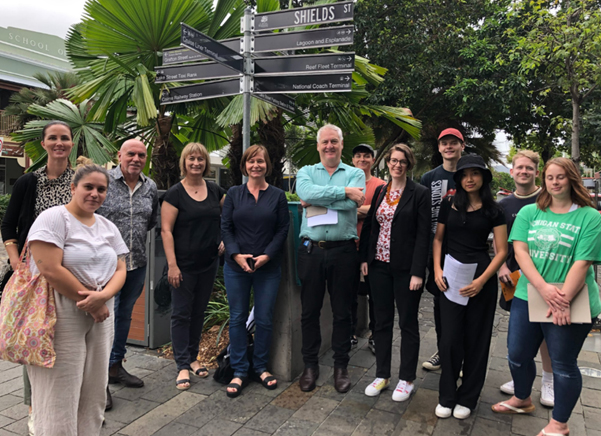
“It’s about creating a pleasant and comfortable experience for walkers on the trail, considering factors such as shade, possible refreshment stops and access to our cultural landmarks, including the Cairns Regional Gallery, Bulmba-ja and Munro Martin Parklands,” Associate Professor Law said.
Read the press release.
TUDLab featured in Cairns Post
6 June 2022
Migration to Cairns
TUDLab's Lisa Law and Rana Dadpour (as well as Cr Amy Eden and Bernard Salt) in today's Cairns Post speaking about migration to Cairns and what it might mean for the city's residential sector. Nice to see a more complex picture being presented by journalist Arun Singh Mann.
“It’s the opposite of a brain drain as the Far North feels the strain of an influx of talent moving to the tropics. Experts have spoken of the benefits to the region and the pressure on housing supply.”
Read the article: ‘Manhattan effect’: What southern migration really means for Cairns
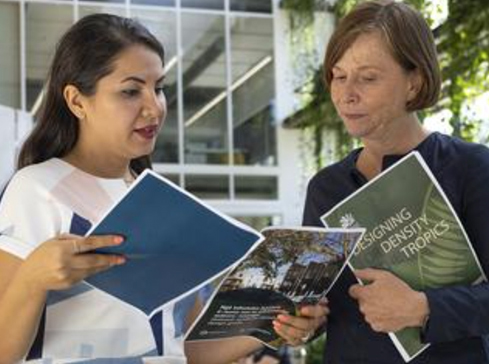
Public transport and density
TUDLab's Lisa Law speaking to Cairns Post about increasing density and public transport so urban development doesn't devour our farmland and world heritage rainforests, or degrade our tropical lifestyle.
Rethinking tightly packed master-planned estates as well as increasing high density urban infill in the city centre are two important agendas as the Cairns Regional Council starts thinking about its Future Growth 2050.
Read the article: Cairns real estate: Template subdivisions could become run-down estates
"Tribute" Arone Meeks: Eddie Koiki Mabo Library Art Exhibition
31 May 2022
TUDLab's Russell Milledge was involved in filming a video about "Tribute", an exhibition celebrating nationally and internationally acclaimed Queensland artist Arone Meeks (1957 – 2021) now open at JCU's Eddie Koiki Mabo Library. 2022 is the 30th anniversary of the Mabo Decision and Meeks' ties with the Mabo family are long-lasting and evident through this beautiful exhibition of paintings and monoprints.
TUDLab featured in the Tropic magazine
3 June 2022
TUDLab’s Rana Dadpour has been featured in the Tropic’s issue 36! In this article she talks about regional migration to tropical FNQ in a COVID-era and challenges & promises involved.
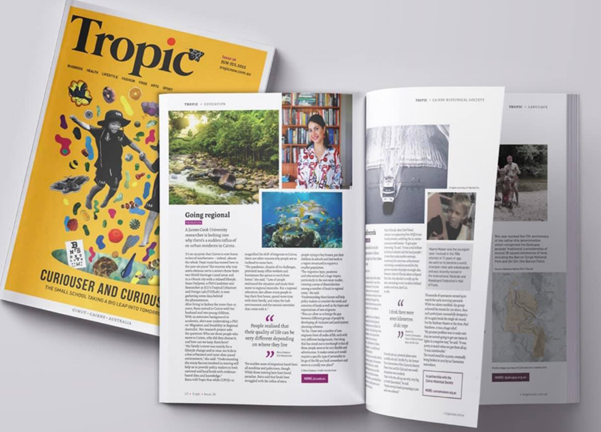
Cairns and Far North Queensland's best new buildings and architecture
19 May 2022
TUDLab is delighted to have an entry in the Australian Institute of Architects awards! Tropic Now is hosting the inaugural People’s Choice Award, and voting is open. So many fantastic projects to vote for this year. Have a look at the entries and if inclined vote for our "Masterplanning for Small Communities" project. Our team has spent a lot of time in Innisfail, Ravenshoe and Malanda.
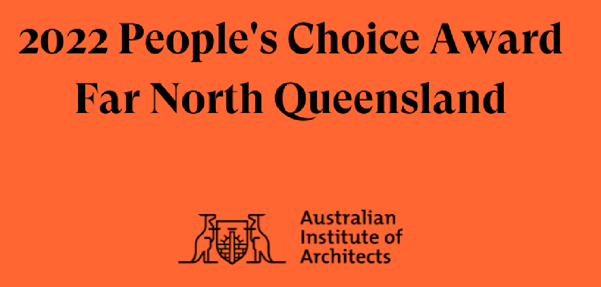
“The TUDLab team has worked on several master planning exercises in collaboration with partners including the Hinchinbrook Shire Council (Ingham) and the Cassowary Coast Regional Council (Innisfail) and the Tablelands Regional Council (Ravenshoe and Malanda). TUDLab ran intensive design studios at these sites which combined the knowledge and expertise of academics, local planners, industry experts and students. These collaborative partnerships across academia, local government, and industry have produced research-informed analysis and draft master plans of great benefit to local communities.”
You can read more about our entry.
We are hopeful for continued recognition of the work!
Silver cities: planning for an ageing population in Singapore. An urban planning policy case study of Kampung Admiralty
3 May 2022
Hot off the press! TUDLab's Simona L. Azzali and colleagues explore how Singapore adapts its planning policy and practices to meet the needs of its 'silver' population, particularly the relationship between ageing related policies and urban development strategies.
From the abstract: “This paper explores ways in which Singapore adapts its planning policy and practices to meet the needs of its growing silver population, particularly the relationship between ageing related policies and its urban development strategies. The research assesses Singapore's urban planning policies for the ageing population against the WHO framework for age-friendly cities using Kampung Admiralty (KA) (a pioneering project of integrated housing cum community for the ageing population) as a case study for the analysis. The methodology adopted includes a post-occupancy evaluation and a walking tour of the selected case study (Kampung Admiralty), and an analysis of Singapore's ageing policies in relation to urban planning governance.”
“Understanding the ‘region’ in COVID-19-induced regional migration: mapping Cairns across classification systems”
18 April 2022
Are you interested in the current COVID-19 migration debate and the notion of ‘region’? Do you want to know how the city of Cairns, in Queensland fits into a wider geography of internal urban-rural migration in Australia?
TUDLab’s Rana Dadpour and Lisa Law discuss these and analyse the imagined geographies of different Australian regional classification systems in their newly published article in the Australian Geographer Journal.
From the abstract: “This paper unpacks the notion of ‘region’ in the current COVID-19 migration debate to understand how the city of Cairns, Queensland fits into a wider geography of internal urban-rural migration in Australia. It unpacks different constructions of ‘region’, showing how they often articulate ‘access’, ‘rural’ and ‘remote’ and a general sense of non-urban entities. We discuss the imagined geographies of different Australian regional classification systems such as the Australian Statistical Geography Standard (ASGS), Rural, Remote and Metropolitan Area (RRMA) and Modified Monash Model (MMM). We show how definitions and classifications of ‘region’ are constructed in particular ways to address political and social issues such as economic development, health, immigration and wider policy-making agendas. The analysis deployed develops a framework for understanding key dimensions of regionality relevant to migration to Cairns in the COVID-19 moment. A critical interpretive analysis helps shed light on the importance of place/context in relation to Australia’s recent urban--rural internal migration debate, but also provides insights to the counter-urbanisation debate in terms of displacing notions of the ‘rural idyll’.”
Read the full article here: https://www.tandfonline.com/doi/abs/10.1080/00049182.2022.2059128?journalCode=cage20&fbclid=IwAR1rnhBVGJPAEQQ2Gm-vCea-cVbmGzBejjAscJx7C2zBqJyZF1pAAjDfJNk
New Paper on thermal comfort in tropical housing in Darwin
4 April 2022
TUDLab's Lisa Law worked with this stellar team led by JCU alumna Shokhida Safarova to understand thermal comfort in tropical housing in Darwin. The research puts numbers to what we suspected but didn't yet have data for: many in the tropics are comfortable in warmer and more humid conditions than mandated by national building codes, and housing close to green spaces/parks needs less air-conditioning. Let's demand better housing and subdivision design for the tropics!
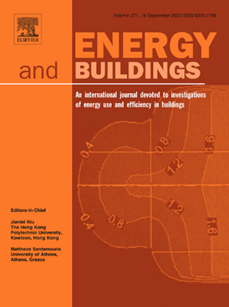
Highlights are:
- Thermal comfort conditions were investigated in 4 to 7 star rated houses in Darwin, Australia, which has a tropical savanna climate.
- Although available in all houses, air-conditioner use was not universal during the hotter more humid seasons with many opting to use natural ventilation, fans and more frequent drinking to maintain thermal comfort.
- Houses rated at 6 to 7 stars in the NatHERS system were generally more comfortable during the hot seasons than those rated at 4 to 5 stars.
- Many people opted to live in conditions that were hotter and more humid than recommended under current building regulations.
Pre-proofs are available here:
Festival Tanjung Waka
28 March 2022
TUDLab's Lisa Law spoke at the Festival Tanjung Waka online International Seminar on Sustainable Coastal Tourism. Together with Prof Bill Carter of USC, they discussed opportunities for tourism development in places of environmental and cultural significance.
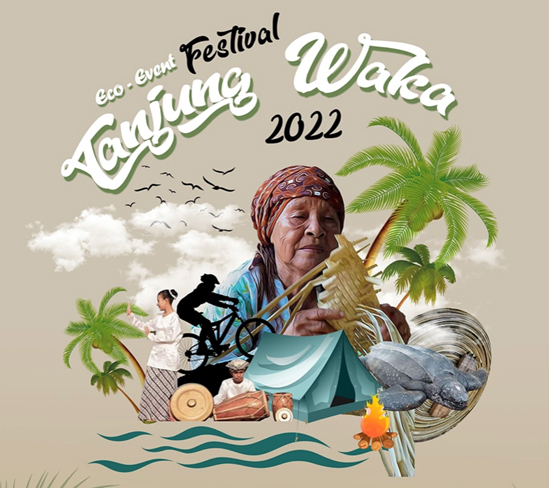
The seminar was in Kepulauan Sula/Maluku Utara, a site the Indonesian Ministry of Tourism is promoting as a marine tourism destination. Lots of lessons from Cairns, and A/Prof Law spoke about the need to remember the city's role in reef protection and Prof Carter spoke about ecotourism and sustainable tourism.
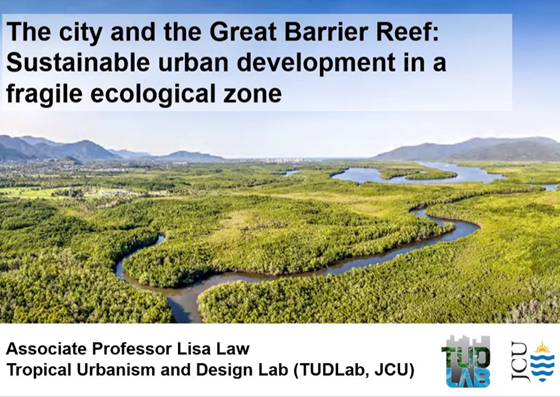
Smithfield State High School and TUDLab
13 March 2022
TUDLab was delighted to work with Smithfield State High School students studying city planning and design to help make Cairns more liveable and resilient to climate change.
The students gathered data, brainstormed ideas, and developed concept designs after completing three weeks of theory with lecturers in Urban Design from James Cook University. The unit included a site visit to Yorkeys Knob to analyse the existing environment including the coastal dunes, vegetation, and rocky point. To gain a deeper understanding of the urban landscape they also interviewed local residents and studied the area’s Indigenous heritage.
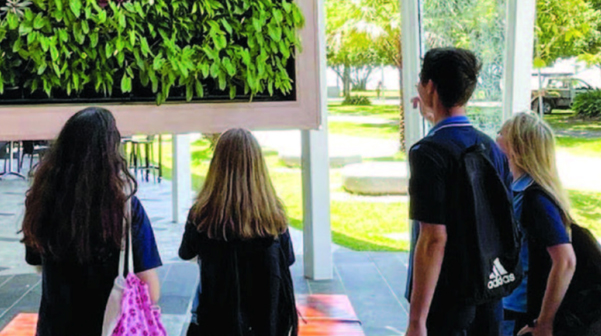
The students cited precincts such as McLeod and Abbott Streets which appear to have been neglected whilst council has focused on areas such as The Esplanade. Their recommendation was to revitalize abandoned precincts by adopting the same tropical urbanism strategy council has used on the waterfront.
Well done to this enthusiastic crew who developed innovative ideas for tropical city-making!